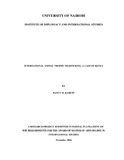| dc.description.abstract | Globally, survival of wildlife in many range states is threatened by animal trophy
trafficking. The trafficking has reached unprecedented levels with large volumes of
animal trophies being intercepted in various parts of the world many of which originate
from the African range states including Kenya. The study seeks to investigate why
international animal trophy trafficking continues despite an established state agency
responsible for the protection and conservation of wildlife in Kenya. Specifically, this
study seeks to examine the nature and status of international animal trophy trafficking in
the world; assess the efficacy of existing global, regional and national legal and
institutional frameworks in addressing trophy trafficking; examine the factors that
influence the rise of international animal trophy trafficking in Kenya; and analyse the
impact of international trophy trafficking on national security. This study utilizes
liberalism and rational choice theories. The liberalism theory guides this study in studying
the cooperation among the multiple actors in international trophy trafficking. Moreover,
with sustained motivation for animal trophy trafficking despite known penalties, the
rational theory guides this study in finding out the reasons motivating involvement in this
trade despite the enacted laws and creation on institutions in the fight against animal
trophy trafficking. This study hypothesizes that animal trophy trafficking is rampant
internationally; securing wildlife is dependent upon effectiveness of the international
community, institutional frameworks and other actors discharging their mandates; and
that a relationship exists between international trophy trafficking and national security.
This study adopted a descriptive whose target population are employees of Kenya
Wildlife Service and selected conservation NGOs with the data being captured through a
semi structured questionnaire. Both descriptive and inferential statistics are used in
analyzing the data. Findings indicates that drivers of trophy trafficking are similar to
those that drive other crimes including globalization, improved communication,
underdevelopment and government laxity. Findings show that challenges that prevent
deterrence to trophy trafficking originate from societal and cultural situations, national
government law orientations and enforcement. Findings indicate that international animal
trophy trafficking is rampant globally and ineffectiveness by the government in managing
the crime is the greatest factor that influence the rising trends in trophy trafficking. From
the findings, legal and institutional frameworks existing at global, regional and national
levels have varying degree of effectiveness in the execution of the enacted laws and
legislations which result into gaps that are exploited by the criminal syndicates regardless
of the commitment and cooperation between countries towards the promotion of
preventive intervention. These findings are in tandem with the liberalism and neoliberal
theories because even for those states with adequate laws, governance is marred with selfinterests
perpetrated by anarchy due to absence of political authority and cooperation.
This study further established that animal trophy trafficking has effects on national
security. This study recommends that animal trophy trafficking be framed as a national
security issue that needs global response through well interlinked governance systems in
both source and consumer states. The existing loopholes in collaborative arrangements
between the respective global, regional, and national agencies be streamlined so as to
effectively execute provisions in various legislations deterring animal trophy trafficking.
Considering that this study was conducted at the Kenya Wildlife Service and selected
conservation NGOs, responses adopted may be biased due to contextual differences. This
x
study recommends that a similar study is done cutting across other wildlife range states to
allow for broader generalization and comparison of findings. | en_US |



